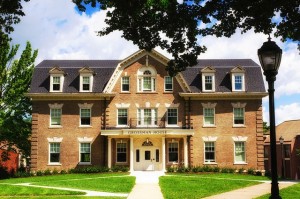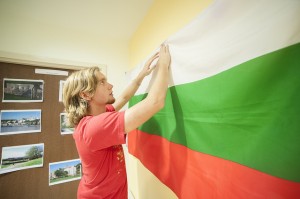Intellectually adventurous students have an exciting new campus living option in the Grossman House for Global Perspectives. Grossman House allows students to design their own programming with the guidance of faculty advisers to explore globalization and what it means to live in a multicultural world.
One of the first orders of business for the 25 student residents and their faculty advisers is to begin to define the term globalization.

The exterior and courtyard of Grossman House
“I want us to figure out what globalization means,” says economics major Ivy DeWitt ’14 (Yeadon, Pa.). “Is it a good or bad thing, and should we even be concerned about it? I’m especially interested in macroeconomics, so I believe that in the political and economic spheres, globalization is a very important topic. I’m also concerned about the cultural aspects of globalization because the gradual connections of cultures could influence the ways we view religion, gender, race, and many other facets of our lives.”
The house itself, which will be dedicated during a ceremony Friday, April 5, is a former fraternity house built in 1915. The fully renovated building contains both single- and double-occupancy rooms and a large open library on the first floor where residents and other members of the campus community can gather for special events and discussions.
It is named in honor of Trustee Emeritus Richard Grossman ’64 and his wife, Rissa, for their generosity in supporting student engagement and interaction within a residential community at Lafayette. Sustaining members of the Marquis Society for over 25 years and members of the Société d’Honneur, the Grossmans previously funded the Grossman Gallery in the Williams Visual Arts Building and the Grossman Visiting Artist and Exhibition program.
One of the most important aspects of Lafayette’s strategic plan is to increase the College’s commitment to global education. To be truly effective, it cannot stop with the curriculum, says Grossman adviser William Bissell, associate professor of anthropology and sociology.
“Ideas aren’t just abstract or isolated in texts or class debates, but have both force and relevance in everyday life,” he says. “There is real value in connecting scholarly debates to current events, contemporary media, work, and life beyond the classroom walls, and Grossman House is one way to integrate curricular and extracurricular efforts, instantiating what it means to inhabit an intellectual community.”

Conner Christensen ’15 hangs a Bulgarian flag in Grossman House.
The residents of Grossman House are a microcosm of world cultures. About a third are international students, a third are students who have traveled abroad, and a third are interested in a study abroad experience. Together, they make up what adviser Robert Blunt, assistant professor of religious studies, calls “a community of inquiry.”
“Grossman House is an exceptionally good group of people,” says Blunt. “We want to bring together students who are interested in considering the big issues, rethinking categories of identity. I want to help our students think in more critical terms about what it means to be a member of a society or nation in a globalized world.”
The students are working hard to create interesting and fun programming that delves into the deeper questions. They hosted a dinner with Papermoon Puppet Theater, a group of artists from Indonesia, after its performance on campus. For mechanical engineering major Rijan Maharjan ’14 (Kathmandu, Nepal), it was an eye-opening experience. He was unaware of the chaos that enveloped Indonesia when it gained sovereignty from the Netherlands. He notes that while he could have read about it online, Grossman House gave him the opportunity to learn about it from native Indonesians.
That is exactly the point, says adviser Nandini Sikand, assistant professor of film and media studies.
“It is a way to deepen our understanding of the global and the local,” she explains. “The global is not something that happens to ‘those people over there,’ but rather is a way to demystify and live what we mean by notions of globality and the points of intersection that exist.”
Being a physical community is just as important as being an intellectual one. There is no substitute for the learning that comes with daily interaction with people from various cultures. Maharjan shares a suite with two students from the U.S., one from India, and one from Jamaica. He knows that as an engineer, his work will not end at solving problems. He needs to understand people from everywhere.
“Grossman House is a multicultural experience up close; it gives me an opportunity to learn more about people,” he says. “I learn new things about their culture. I learn to be tolerant and understanding. That is something I cannot get out of a class. If I keep myself constrained to engineering and nothing else, I might be able to solve a problem but not the specific problem of a particular group of people. The Grossman experience adds value to my engineering degree.”
Like Maharjan, DeWitt loves the access to various cultures and backgrounds that living in Grossman House provides. Last semester, she took the course Hinduism: Unities and Diversity and enjoys comparing the holy texts to the way many students in Grossman view modern Hinduism. Living with students who have entirely different perspectives than she does is a “breath of fresh air,” she says.


7 Comments
Comments are closed.